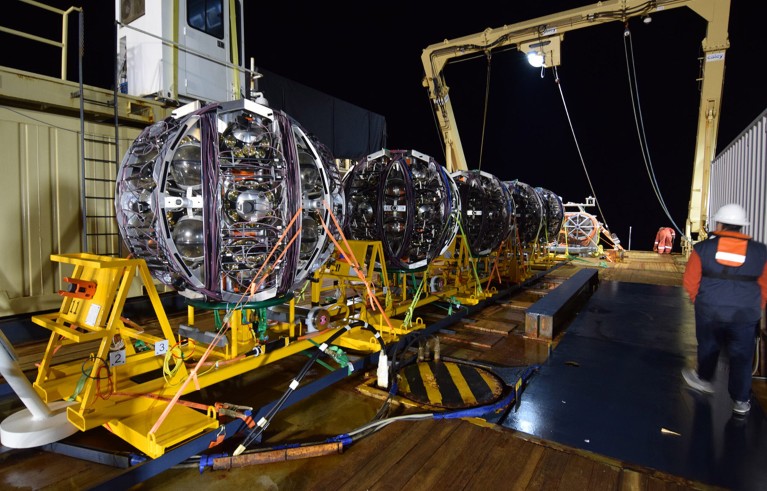Hello Nature readers, would you like to get this Briefing in your inbox free every day? Sign up here.

Five ARCA detectors on board a ship, ready for deployment.Credit: KM3NeT Collaboration
An observatory in the depths of the Mediterranean Sea has spotted what could be the most energetic neutrino ever detected — “a fantastic event”, says physicist Francis Halzen. Neutrinos are tiny subatomic particles that travel at nearly the speed of light and are thought to come from cataclysmic cosmic events, such as a growth spurt of a supermassive black hole. For now, the team is staying quiet about the direction the neutrino came from to avoid tipping off competitors about its origin.
The frequency at which extreme fires occur around the world has more than doubled during the past two decades, according to an analysis of satellite data. The results provide the first solid evidence to support a nagging suspicion that many scientists and others have had as they watch a seemingly endless series of infernos scorch ecosystems and communities: wildfires have increased somehow, and climate change is almost certainly a factor. “It’s the extreme events that we care about the most, and those are the ones that are increasing quite significantly,” says ecologist Calum Cunningham.
Reference: Nature Ecology & Evolution paper
The gut microbiome can usefully predict how people respond to certain immunotherapy drugs for treating cancer. Instead of singling out individual microbes, researchers showed that the overall balance between bacterial communities in the gut affects a person’s response. The team developed a scoring system based in part on the ratio between two different populations of gut microbes. When applied to hundreds of people with cancer, the score could mostly predict who would respond to immunotherapy. The work “is a breakthrough from a diagnostic point of view”, says immunologist Fabio Grassi. The study might also improve the effectiveness of faecal microbiome transplants — when healthy volunteers donate bacterial samples to people who don’t respond well to certain drugs.
As the solar wind dropped to a whisper for 28 hours in December 2022, scientists got the first-ever unimpeded view from Earth of the ‘polar rain aurora’. The rare phenomenon created a diffuse glow spanning more than 3,000 kilometres across the North Pole. Polar rain auroras form when electrons from the Sun’s outermost atmosphere crash into Earth’s atmosphere. Usually, the solar wind — a flood of other charged particles coming from the Sun — prevents their formation. They have only occasionally been spotted by satellites looking down on the poles from above.
Reference: Science Advances paper
Features & opinion
Billions of tonnes of carbon have been lost from the soil because of agricultural practices such as tilling, which ploughs up the organic matter deep in the soil, nourishing crops — and releasing CO2 into the atmosphere. The good news is that we can restore soil’s role as a carbon sink. “Before soil carbon was even a thing from a climate-change perspective, people were promoting the increase of organic matter in the soil to improve its fertility, to improve water-holding capacity and resilience to droughts, and to prevent erosion,” says soil scientist Peter Smith. But we’ll have to change many of the bad habits developed to squeeze better short-term yields out of the ground.
Read more in Nature Spotlight: Agricultural sciences.
Many researchers don’t want a well-loved and once-expensive scientific instrument to end up in a landfill. Some manufacturers offer trade-in schemes, used-equipment dealerships buy instruments that are still functioning or could be refurbished, and anything can be sold on eBay. Donating old instruments to labs that can’t afford to buy new sounds like a nice idea, but the practicalities are often difficult. “When the equipment breaks down, most of the time it cannot be fixed,” says chemist Oladele Oyelakin, who works in the Gambia. “If organizations are giving equipment, it would be nice [if] … provision for spare parts and service and maintenance is factored in.”
Chemical & Engineering News | 9 min read
Virtual versions of stressful places — such as an aeroplane, for people afraid of flying — can help mental-healthcare professionals treat their patients. “When there’s emotion or fear involved, your brain doesn’t require a completely realistic setting for something to be, for example, frightening,” says psychiatrist Kim Bullock. In some cases, it actually helps a person to know that a simulation is not real, says clinical psychologist Daniel Freeman. But the details must be carefully designed to ensure the setting makes an impact. “To separate the wheat from the chaff, it is crucial that each VR treatment is tested in a rigorous clinical trial,” says Freeman.
Today I’m reeling from the news that a zoo’s ‘panda pups’ exhibit was just two very fluffy black-and-white dogs. The zoo says its exhibit was accurately named — and I can confirm that, based on the video, it was also adorable.
This newsletter is always evolving — tell us what you think! Please send your feedback to briefing@nature.com.
Thanks for reading,
Flora Graham, senior editor, Nature Briefing
With contributions by Gemma Conroy, Katrina Krämer and Sarah Tomlin
Want more? Sign up to our other free Nature Briefing newsletters:
• Nature Briefing: Microbiology — the most abundant living entities on our planet — microorganisms — and the role they play in health, the environment and food systems.
• Nature Briefing: Anthropocene — climate change, biodiversity, sustainability and geoengineering
• Nature Briefing: AI & Robotics — 100% written by humans, of course
• Nature Briefing: Cancer — a weekly newsletter written with cancer researchers in mind
• Nature Briefing: Translational Research — covers biotechnology, drug discovery and pharma

